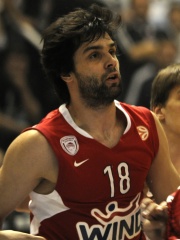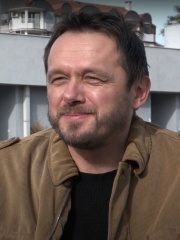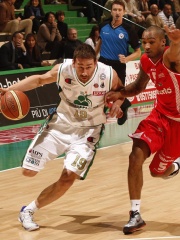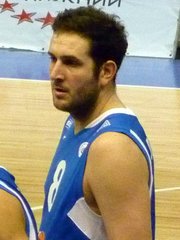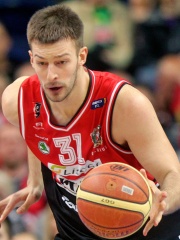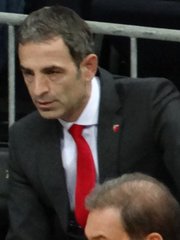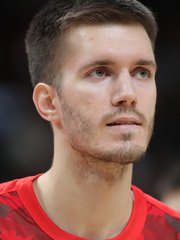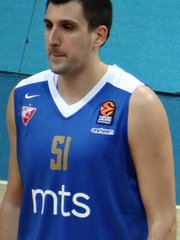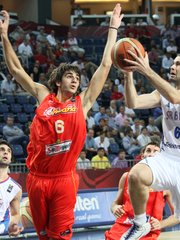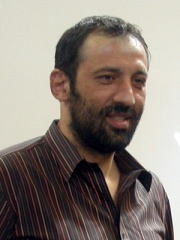
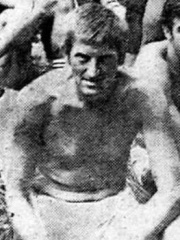
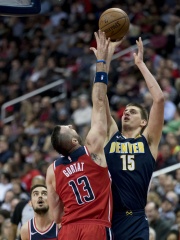
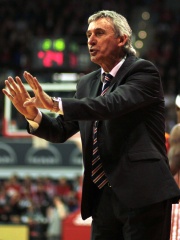
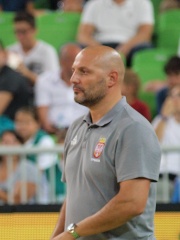
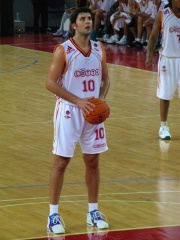
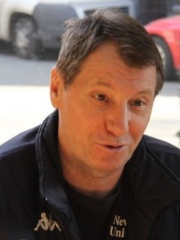
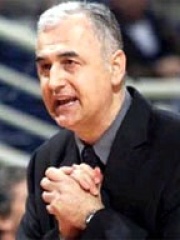
The Most Famous
BASKETBALL PLAYERS from Serbia
This page contains a list of the greatest Serbian Basketball Players. The pantheon dataset contains 1,757 Basketball Players, 66 of which were born in Serbia. This makes Serbia the birth place of the 2nd most number of Basketball Players.
Top 10
The following people are considered by Pantheon to be the top 10 most legendary Serbian Basketball Players of all time. This list of famous Serbian Basketball Players is sorted by HPI (Historical Popularity Index), a metric that aggregates information on a biography's online popularity. Visit the rankings page to view the entire list of Serbian Basketball Players.

1. Vlade Divac (b. 1968)
With an HPI of 66.97, Vlade Divac is the most famous Serbian Basketball Player. His biography has been translated into 42 different languages on wikipedia.
Vlade Divac (Serbian Cyrillic: Владе Дивац, pronounced [ʋlǎːde dǐːʋats]; born February 3, 1968) is a Serbian professional basketball executive and a former player who was most recently the vice president of basketball operations and general manager of the Sacramento Kings of the National Basketball Association (NBA). At 7 ft 1 in (2.16 m), Divac played center and, unlike many centers, was known for his passing skills. He was among the first group of European basketball players to transfer to the NBA in the late 1980s and was named one of the 50 Greatest EuroLeague Contributors. He is one of seven players in NBA history to record 13,000 points, 9,000 rebounds, 3,000 assists, and 1,500 blocked shots, along with Kareem Abdul-Jabbar, Hakeem Olajuwon, Shaquille O'Neal, Tim Duncan, Kevin Garnett, and Pau Gasol. Divac was also the first player born and trained outside the United States to play in over 1,000 games in the NBA. Divac was named to the FIBA All-Time EuroStars Team in 2007. On August 20, 2010, he was inducted into the FIBA Hall of Fame in recognition of his play in international competition. He was elected to the Naismith Memorial Basketball Hall of Fame in 2019. Divac is a humanitarian, helping children in his native country of Serbia and in Africa. In October 2008, he was appointed as government adviser in Serbia for humanitarian issues. In February 2009, he was elected President of the Serbian Olympic Committee for a four-year term and re-elected in November 2012. In 2013, Divac received an honor from the World Sports Humanitarian Hall of Fame.

2. Radivoj Korać (1938 - 1969)
With an HPI of 65.39, Radivoj Korać is the 2nd most famous Serbian Basketball Player. His biography has been translated into 24 different languages.
Radivoj Korać (Serbian Cyrillic: Радивој Кораћ; 5 November 1938 – 2 June 1969) was a Serbian and Yugoslav professional basketball player. He represented the Yugoslavia national basketball team internationally. Korać is well-known for holding the EuroLeague's all-time single-game scoring record (since 1958), at 99 points scored, in a game versus Alviks Stockholm, during the 1964–65 season, and for once making 100 out of 100 free throws on a live television show in Belgium. Korać died in a car crash in 1969, at the age of 30, and FIBA Europe later established the European-wide third-tier level FIBA Radivoj Korać Cup, in his remembrance, in 1971. Korać was named one of FIBA's 50 Greatest Players in 1991. In 2002, the Basketball Federation of FR Yugoslavia named its top national domestic cup competition, the Radivoj Korać Cup, after him. He was enshrined into the FIBA Hall of Fame in 2007, and he was named one of the 50 Greatest EuroLeague Contributors the following year in 2008. In 2022, he was inducted into the Naismith Memorial Basketball Hall of Fame.

3. Nikola Jokić (b. 1995)
With an HPI of 63.84, Nikola Jokić is the 3rd most famous Serbian Basketball Player. His biography has been translated into 46 different languages.
Nikola Jokić ( YOH-kitch; Serbian Cyrillic: Никола Јокић [nǐkola jôkitɕ] ; born February 19, 1995) is a Serbian professional basketball player who is a center for the Denver Nuggets of the National Basketball Association (NBA). Nicknamed "Joker", he is widely regarded as one of the greatest players and centers of all time, and is often considered the greatest draft steal in NBA history. A seven-time NBA All-Star, Jokić has been named to the All-NBA Team on seven occasions (including five first-team selections), and won the NBA Most Valuable Player Award for the 2020–21, 2021–22, and 2023–24 seasons. He represents the Serbian national team, with which he won a silver medal at the 2016 Summer Olympics, and a bronze medal at the 2024 Summer Olympics. Jokić was selected by the Nuggets in the second round of the 2014 NBA draft. He was voted to the NBA All-Rookie First Team in 2016. In the 2018–19 NBA season, while leading the Nuggets to the Western Conference Semifinals, Jokić received his first All-Star and All-NBA First Team selections. The following season, he once again received All-Star and All-NBA honors, while leading his team to the Western Conference Finals. In the 2022–23 NBA season, Jokić was awarded NBA Finals MVP after leading the Nuggets to their first-ever NBA championship. He ranks third all-time among NBA players with the most triple-doubles and holds the record for the fastest triple-double (achieved in 14 minutes and 33 seconds). He is the only NBA player ever to achieve a 30+ points, 20+ rebounds, and 20+ assists game.

4. Svetislav Pešić (b. 1949)
With an HPI of 62.46, Svetislav Pešić is the 4th most famous Serbian Basketball Player. His biography has been translated into 22 different languages.
Svetislav "Kari" Pešić (Serbian Cyrillic: Светислав "Кари" Пешић; born 28 August 1949) is a Serbian professional basketball coach and former player. He is the current head coach of Bayern Munich of the Basketball Bundesliga and EuroLeague.

5. Dragan Kićanović (b. 1953)
With an HPI of 60.48, Dragan Kićanović is the 5th most famous Serbian Basketball Player. His biography has been translated into 23 different languages.
Dragan Kićanović (Serbian: Драган Кићановић; born 17 August 1953) is a Serbian and Yugoslav retired professional basketball player. A 1.92 m (6 ft 3+1⁄2 in) tall shooting guard, Kićanović played in the 1970s and 1980s, and is considered to be one of the best European players and scorers of all time, having won both the Mr. Europa and the Euroscar European Player of the Year awards in 1981 and 1982. He was named one of FIBA's 50 Greatest Players in 1991. On 20 August 2010, Kićanović became a FIBA Hall of Fame player, in recognition of his play in international competitions. He was named the Best athlete of Yugoslavia in 1982, and he was also named the Best Basketball Player of Yugoslavia in the 20th century. Since September 2013, he's been performing the role of consul general at the Serbian consulate in Trieste.

6. Aleksandar Đorđević (b. 1967)
With an HPI of 59.61, Aleksandar Đorđević is the 6th most famous Serbian Basketball Player. His biography has been translated into 33 different languages.
Aleksandar "Saša" Đorđević (Serbian Cyrillic: Александар "Саша" Ђорђевић, pronounced [aleksǎːndar sâʃa dʑǒːrdʑeʋitɕ]; born 26 August 1967) is a Serbian professional basketball coach and former player. He most recently served as a head coach for the senior men’s team of China. During his playing career, he was listed as a 1.88 m (6'2") 90 kg (198 lb.) point guard. During his pro club playing career, Đorđević, along with his teammate Predrag Danilović, helped to lead Partizan to its first EuroLeague title in 1992, while he earned an All-Final Four Team selection in the process. He was twice named the Mister Europa Player of the Year, in both 1994 and 1995. He also played in a total of 108 games, while representing the senior national teams of SFR Yugoslavia, and later FR Yugoslavia. As a player, he won gold medals at the 1991 EuroBasket, the 1995 EuroBasket, the 1997 EuroBasket, where he was named the Most Valuable Player, and the 1998 FIBA World Championship. In 1995, Đorđević received the Golden Badge award for the Best Athlete of FR Yugoslavia, and the Yugoslav Olympic Committee declared him the Sportsman of the Year. In 2008, Đorđević was named one of the 50 Greatest EuroLeague Contributors. Đorđević is most well-known for two famous game-winning shots that he hit during his playing career. He hit the game-winning shot of the 1992 EuroLeague Final, and the game-winning shot of the 1997 EuroBasket game between FR Yugoslavia and Croatia. He is the only person that has won medals at the Summer Olympic Games, the FIBA World Cup, and the FIBA EuroBasket, as both a player and as a head coach.

7. Dejan Bodiroga (b. 1973)
With an HPI of 59.35, Dejan Bodiroga is the 7th most famous Serbian Basketball Player. His biography has been translated into 33 different languages.
Dejan Bodiroga (Serbian Cyrillic: Дејан Бодирога; born 2 March 1973) is a Serbian basketball executive and former professional player, who is currently the president of EuroLeague Basketball. In 1998 and 2002, he received the Golden Badge award for the best athlete of Yugoslavia, and the Yugoslav Olympic Committee also declared him the Sportsman of the Year. He was named to the FIBA All-Time EuroStars Team in 2007. In 2018, he was named one of the 101 Greats of European Basketball. HoopsHype named Bodiroga one of the 75 Greatest International Players Ever in 2021. He was inducted into the Greek Basket League Hall of Fame in 2022. During his playing career, he mainly played at the small forward position, but he could also play point forward, and at both guard positions. A EuroLeague icon of the early part of the 2000s, Bodiroga was named to the 50 Greatest EuroLeague Contributors in 2008, and to the EuroLeague 2000–2010 All-Decade Team in 2010. He was also voted by fans the EuroLeague's 2000–2010 Player of the Decade. At the club level, Bodiroga proved himself to be a symbol of basketball excellence, by lifting consecutive EuroLeague trophies in 2002 and 2003, with Panathinaikos and FC Barcelona, as he earned the EuroLeague Final Four MVP award both times. He also won each of the three major European national domestic basketball league titles: the Spanish ACB League, the Italian A League, and the Greek Basket League. He is widely regarded as one of the greatest European players of all time. With the senior FR Yugoslavian national team, Bodiroga won three EuroBasket gold medals, in 1995, 1997, and 2001, as well as a bronze medal in 1999. With FR Yugoslavia, he also won a silver medal at the 1996 Summer Olympics. In addition to that, Bodiroga also won two FIBA World Cup gold medals with FR Yugoslavia, in 1998 and 2002, earning MVP honors in the former.

8. Zoran Slavnić (b. 1949)
With an HPI of 58.68, Zoran Slavnić is the 8th most famous Serbian Basketball Player. His biography has been translated into 20 different languages.
Zoran "Moka" Slavnić (Serbian Cyrillic: Зоран Мока Славнић; born 26 October 1949) is a Serbian retired professional basketball player and coach. He played with Crvena zvezda and with Partizan. One of the best European point guards of all time, he was named one of FIBA's 50 Greatest Players in 1991 and became a FIBA Hall of Fame player in 2013. With Crvena zvezda, he won two Yugoslav National Championships, three Yugoslav National Cups, and one FIBA European Cup Winner's Cup. He also won the Spanish League championship with Joventut Badalona. During his basketball career, he played for Crvena zvezda (1967–1977), Joventut Badalona (1977–1979), Šibenka (1979–1981), and Partizan (1981–1982). His head coaches were Ranko Žeravica, Zdravko Kubat, and Mirko Novosel. Slavnić was one of the rare players who won everything he could in a career with his national team: 3 EuroBaskets (1973, 1975, 1977), the FIBA World Cup (1978), and Summer Olympics gold (1980).

9. Dragan Šakota (b. 1952)
With an HPI of 54.75, Dragan Šakota is the 9th most famous Serbian Basketball Player. His biography has been translated into 15 different languages.
Dragan Šakota (Serbian Cyrillic: Драган Шакота, Greek: Ντράγκαν Σάκοτα; born June 16, 1952) is a Serbian and Greek professional basketball coach, currently coaching AEK Athens of the Greek Basketball League (GBL).
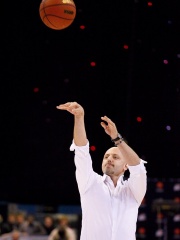
10. Saša Obradović (b. 1969)
With an HPI of 53.16, Saša Obradović is the 10th most famous Serbian Basketball Player. His biography has been translated into 18 different languages.
Saša Obradović (Anglicized: Sasha Obradovic; Serbian Cyrillic: Саша Обрадовић, pronounced [sâʃa obrǎːdoʋit͜ɕ]; born 29 January 1969) is a Serbian professional basketball coach and former player who is the head coach for Crvena zvezda of Basketball league of Serbia (KLS), the ABA League and the Euroleague. Standing at 1.97 m (6 ft 5+1⁄2 in), he played in the guard position for Crvena zvezda, Limoges, Alba Berlin, Virtus Roma, Budućnost, and RheinEnergie Köln. During his playing career, he won FIBA Korać Cup in 1995, three YUBA League championships and a Yugoslav Cup, as well as German League title and three German Cup tournaments. A Yugoslav international, Obradović won three FIBA EuroBasket gold medals (1995, 1997, 2001), and a bronze medal in 1999. He also won the gold medal at the 1998 FIBA World Championship and the Olympic silver medal at the 1996 Olympics. Obradović finished his playing career in 2005 with RheinEnergie Köln. The following season, he became their head coach and won the German League in his rookie season. In the 2011–12 season, he coached Donetsk to their first-ever Ukrainian Super League title. Thereafter, he coached Alba Berlin for four seasons, winning three German Cup tournaments. In 2018 Obradović won the Russian Cup with Lokomotiv Kuban, earning the EuroCup Coach of the Year award.
People
Pantheon has 66 people classified as Serbian basketball players born between 1938 and 2001. Of these 66, 63 (95.45%) of them are still alive today. The most famous living Serbian basketball players include Vlade Divac, Nikola Jokić, and Svetislav Pešić. The most famous deceased Serbian basketball players include Radivoj Korać, Dragan Labović, and Stevan Jelovac. As of April 2024, 11 new Serbian basketball players have been added to Pantheon including Dragan Labović, Milenko Topić, and Miroslav Berić.
Living Serbian Basketball Players
Go to all RankingsVlade Divac
1968 - Present
HPI: 66.97
Nikola Jokić
1995 - Present
HPI: 63.84
Svetislav Pešić
1949 - Present
HPI: 62.46
Dragan Kićanović
1953 - Present
HPI: 60.48
Aleksandar Đorđević
1967 - Present
HPI: 59.61
Dejan Bodiroga
1973 - Present
HPI: 59.35
Zoran Slavnić
1949 - Present
HPI: 58.68
Dragan Šakota
1952 - Present
HPI: 54.75
Saša Obradović
1969 - Present
HPI: 53.16
Miloš Teodosić
1987 - Present
HPI: 52.97
Željko Rebrača
1972 - Present
HPI: 51.18
Marko Jarić
1978 - Present
HPI: 50.71
Deceased Serbian Basketball Players
Go to all RankingsRadivoj Korać
1938 - 1969
HPI: 65.39
Dragan Labović
1987 - 2025
HPI: 46.77
Stevan Jelovac
1989 - 2021
HPI: 41.09
Newly Added Serbian Basketball Players (2025)
Go to all RankingsDragan Labović
1987 - 2025
HPI: 46.77
Milenko Topić
1969 - Present
HPI: 45.73
Miroslav Berić
1973 - Present
HPI: 41.85
Aleksa Avramović
1994 - Present
HPI: 40.79
Filip Petrušev
2000 - Present
HPI: 39.90
Vanja Marinković
1997 - Present
HPI: 38.30
Milko Bjelica
1984 - Present
HPI: 38.16
Aleksandar Rašić
1984 - Present
HPI: 37.65
Dejan Davidovac
1995 - Present
HPI: 34.07
Mihailo Vasić
1993 - Present
HPI: 31.39
Aleksandra Crvendakić
1996 - Present
HPI: 30.70
Overlapping Lives
Which Basketball Players were alive at the same time? This visualization shows the lifespans of the 3 most globally memorable Basketball Players since 1700.

